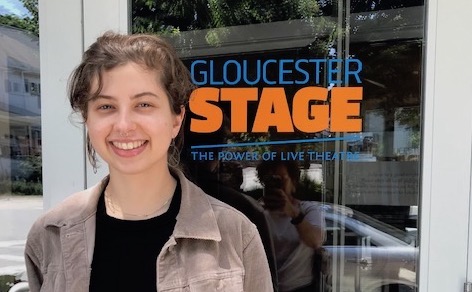During their 40th year, Gloucester Stage Company is digging deep on local stories and community participation, and encouraging local kids to get involved in theater
Commemorating its anniversary, Gloucester Stage Company is celebrating its home port more than ever. With a harbor full of sailboats right out its back door, the rich history of a historic working waterfront all around, and neighbors with countless tales of their own, the theater is embracing the community through rich storytelling and programming.
On a recent hot summer morning, students through Gloucester High School’s LEAP for Education program, gathered at the theater. There, they learned how to usher, toured the on-site shop where sets are built, and discussed marketing strategies for the theater’s current production. (The 39 Steps, which runs until July 28, is a witty take on Hitchcock’s classic thriller.)
“Now, who wants to walk around with flyers while Nate wears the sandwich board,” asks Heidi Dallin, the GSC’s Education Director, who first started volunteering there when she was growing up in Gloucester. “The big thing that’s changed in the 40 years we’ve been here is the youth program,” says Dallin.
Children as young as five are taught acting. Programs run in the summer and school year, and go beyond what happens on the stage. In the Gloucester Stage Youth Acting Workshops, kids receive a full professional theater training program, learning sword fighting, playwriting, costuming, lighting, dialects, and stage makeup. Taught by Dallin and guest instructors, the experience can help kids build skills in communication, public speaking, teamwork, understanding complex reading, confidence, and more.
In addition to the interns, who receive a stipend from LEAP and complimentary tickets to shows, is the apprentice program, which has been going on since 2015. Eight recent college grads live together in a house for the summer and each has a designated role in directing, tech, marketing, and so on as they work on mainstage productions with professionals. The younger high school students recently listened closely as a Bard graduate shared her college theater experience and explained how she discovered her passion for building sets.
“The point of this story is to be open to everything and try new things,” says Dallin.
Liana Genoud, a recent graduate of Emerson College, is the education apprentice for the summer. “Theater kept me out of trouble and made me a more empathetic person,” she says. “You get to play different kinds of people and see the world from their view.”

She has taught A MidSummer Night’s Dream to kids and found that Shakespeare can be really accessible to children. “Shakespeare can seem so high brow, but it’s not out of reach. It teaches us what it’s like to be human.”
Genoud is especially excited for the GSC’s fall production of Hamlet, when the lead role will be played by a woman. “I want to create things, tell stories and make art,” says Genoud, acknowledging the difficulty recent college grads have in getting jobs in their field, especially in the arts. “Here, we get to surround ourselves in a theater and be constantly around working artists.”
One of those working artists is Lindsay Crouse, who has made Gloucester her home after performing in the theater numinous times. Dallin calls Crouse, “our own local Academy Award nominee,” who is volunteering to act out ten-minute plays written by children in a Young Playwrights Festival happening September 17, where professional actors donate their time to do staged readings of the winners. The theme this year is “Risking Everything.”
This last fall, Gloucester lawyer and playwright Ken Riaf’s My Station in Life featured the story of local recluse Simon Geller, who ran a classical music station from his Gloucester apartment from 1964 to 1988. Actor Ken Baltin so embodied the crusty Geller, as he shamed his listenership—local fishermen and residents—for not giving him money, that the performance earned him an Elliot Norton Award. The play began in the GSC’s Never Dark series, where new voices are given staged readings.
“We have a duty and exciting responsibility to be part of a community that reflects the culture of our neighbors,” says Christopher Griffith, Interim Managing Director of the theater. This includes shows like the upcoming Ben Butler, about a Union General who made the game-changing move to ignore the law and not return an escaped slave to the south during the Civil War. A lawyer and former Governor of Massachusetts who championed the causes of labor and of naturalized citizens, Butler spent his summers in the Bayview neighborhood of Gloucester, what is now the Ames Estate, where his descendants still live.
“It’s a unique opportunity to touch history in a different way,” says Madison Cook-Hines, a directing apprentice this summer, who is assistant directing the production. While doing research on the time of the play, Cook-Hines sees herself as a bridge between the history and contemporary audiences. “When you think of the Civil War, it seems to be a southern story, but in this play, we must think of choices that the northerners made.”
An upcoming event at the Cape Ann Museum on July 27 paints the full picture of Butler’s life when his original diary and other personal objects will be on view. This is coupled with a discussion among his descendants, a noted historian and actors in the upcoming production. Griffith says its partnerships like with CAM and the local library — a book club reads books that tie into some of the theater’s productions — that make these theater experiences more immersive.
For 40 years, Gloucester Stage Company has managed to tell stimulating and relevant stories, both local and global, in an intimate black box setting. Their building, in a century-old repurposed brick warehouse, has staged stories about fishermen and fish packing plants and has been renovated slowly over many years to be the destination it is today.
On the sunny hot day I visited the theater, a local woman was visiting with Griffith to discuss staging her one woman show. “We’ve always been innovators,” Griffith says. “We’re trying to develop relationships with playwrights and use what magic we have to amplify their voice.”

